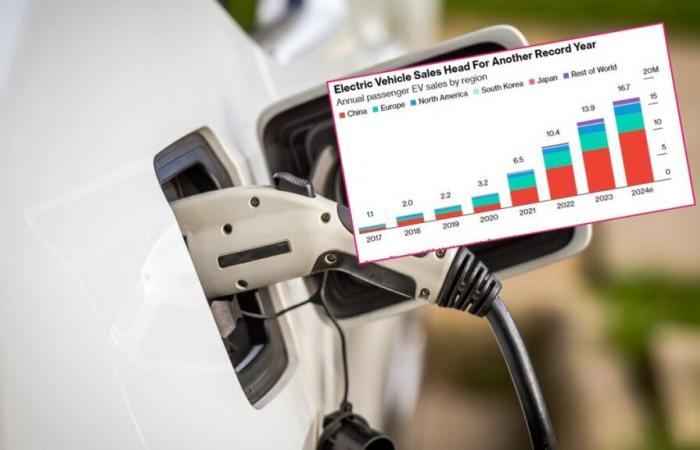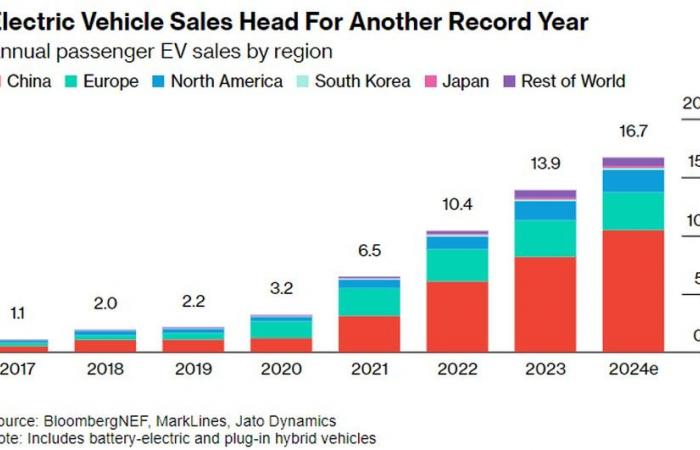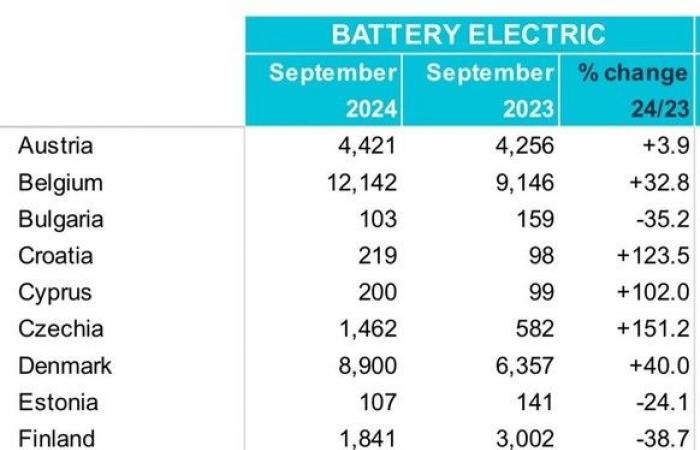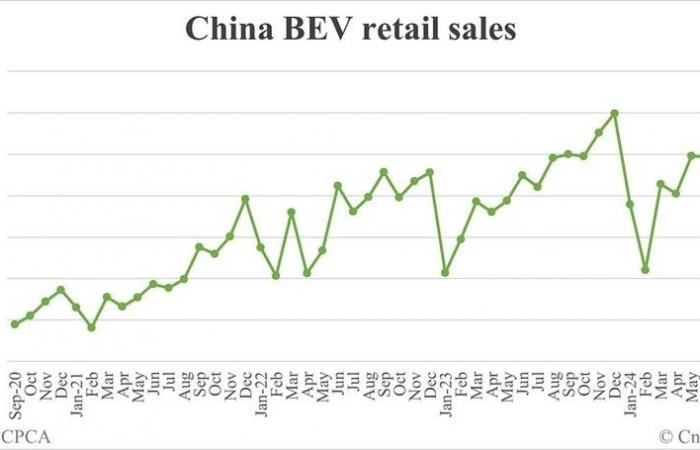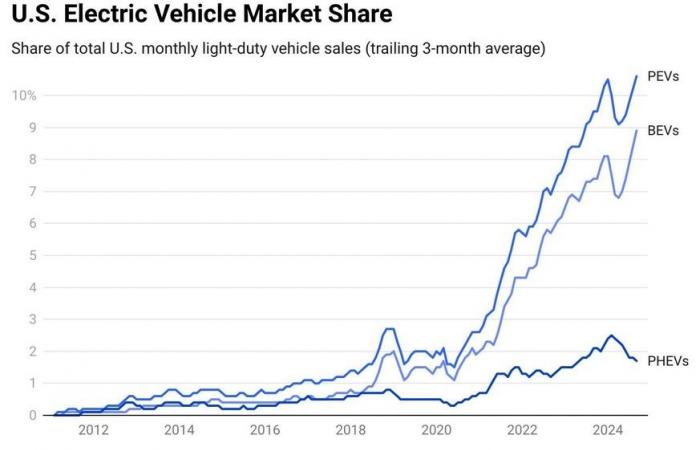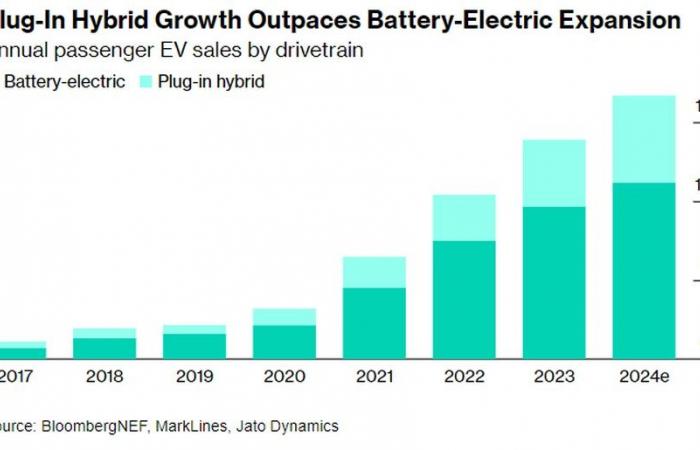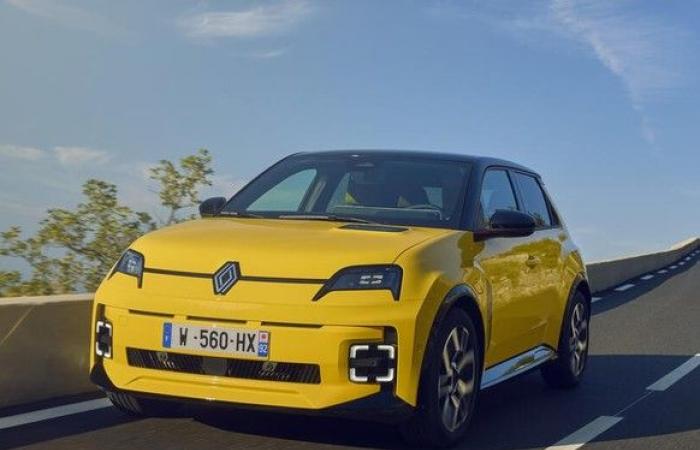Despite everything we hear, electric cars continue to gain ground. 2024 will be another record year and they will soon receive new momentum.
Over the past twelve months, the electric car boom has slowed down – in Germany and here the figures have even fallen. But today, interest in electric vehicles is on the rise again, particularly in Europe, the United States and China, where they are for the first time cheaper and more popular than gasoline cars.
Global electric car sales

Public aid, new models and favorable prices are stimulating growth, first and foremost in China. image: bloomberg/@colinmckerrache
In Europe, electric cars caught their breath in September, after several months of weakness. Some 213,000 fully electric cars have been registered, which represents an increase of 13.9% compared to the same month of the previous year. This growth is notably due to Tesla’s Model 3, whose sales increased by 314%. In Switzerland, on the other hand, the rate fell by 11.2% compared to the previous year.
Electric car sales in September 2024 compared to September 2023

In Europe (EU + EFTA + UK), sales of electric cars increased by 13.9% in September compared to the same month of the previous year, while they fell by 11.2% in Switzerland .
While electric cars have made progress again in Europe, combustion engine cars fell by around 20%. The market share of gasoline cars fell to 29.8%, that of diesel models to 10.4%.
The share of electric cars has therefore increased even more sharply, from 14.8% in September last year to 17.3% today – including EFTA and the United Kingdom, the share of electric vehicles in Europe amounts to 19.1%. Here, electric cars reached 18.7% in September, while in Norway, with 96.4%, customers can almost only find electric cars.
By the end of the year, electric vehicles are expected to continue to grow in most countries, with dealers trying to inflate their quota of electric vehicles by offering discounts.
Hybrid cars are even more in demand than electric cars, with their market share increasing to 32.8%. Hybrids are therefore number one in Europe for the first time and are expected to remain so for the next five years.
China is moving away, the United States is catching up
In 2024, the global electric car market continues to grow, but Europe, and in particular Switzerland, is not contributing to this expansion. Over the first nine months of the year, sales of e-cars in the European Union fell by 5.8% compared to the same period last year. This decline is mainly due to Germany, where new electric car registrations fell by 28.6%.
In Switzerland, sales of e-cars also fell, with a decrease of 9.5% compared to the previous year. This figure exceeds the European average of 5.8%, but remains less significant than the drop observed in Germany.
Electricity is currently growing in the United States and especially in China. In this country, electric cars are back on the fast track after a lackluster start this year.
Electric car sales in China from 2020 to 2024
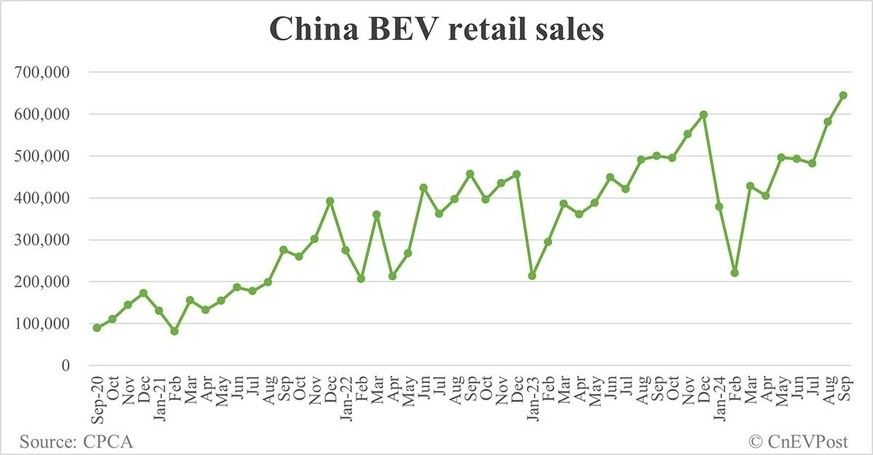
At the start of 2024, electric cars collapsed in China. Thanks to state support and intensive price competition, they are once again reaching a record level.Image: cnEVPost
The Middle Kingdom is making the transition to electromobility much more quickly than the West. Already today, more than one in two cars sold is an electric car or a partially electric plug-in hybrid. With this rapid evolution, combustion cars are expected to become a niche product in China from 2030.
In the United States, sales of electric cars are lagging behind China and Europe. But after a dip in sales, electric vehicles are back on the path to growth in Trump country and are poised to cross the 10% mark for the first time.
Electric cars are making progress again in the United States
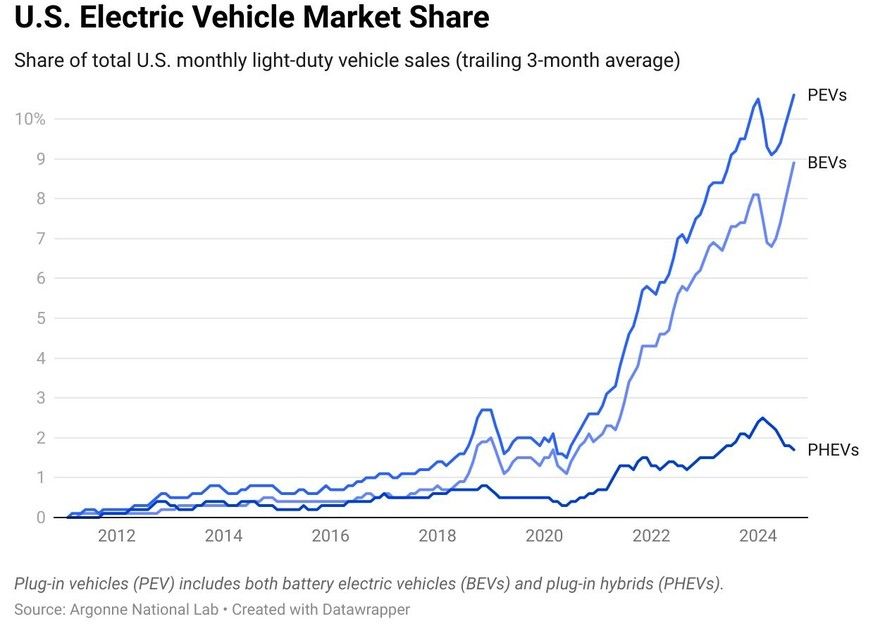
After a dip, electric cars (Battery Electric Vehicle; BEV) are on the rise again in the United States. Partly electric plug-in hybrids (PHEV) are in less demand.graphic: twitter/@AlecStapp
A new boom in electric cars from 2025
Contrary to what some media claim, electric cars will continue to progress in 2024, if we consider not Switzerland or Europe, but the entire world. However, part-electric plug-in hybrids (PHEVs), which are by far not always electric, are progressing more quickly than fully electric cars (BEVs).
Plug-in hybrids are growing faster than electric cars

In 2024, electric cars are growing more slowly than in previous years and plug-in hybrids (PHEV) are growing faster than pure electric cars (BEV). graphics: bloomberg
In total, some 17 million electric and plug-in hybrid cars are expected to be sold in 2024. This is around 20% more than the previous year. Compared to 2021 and 2022, however, growth has slowed over the last twelve months.
The electric car market more dynamic in 2025
Indeed, stricter emissions rules will come into force in Europe from next year. The average emissions of new cars sold will have to increase from 116 grams of CO2 per kilometer currently less than 93.6 g/km, otherwise manufacturers will be exposed to heavy penalties. Dealers are therefore trying to sell as many combustion models as possible this year and increase the share of electric cars next year.
Concretely, manufacturers will have to increase their discounts on climate-friendly electric cars and reduce their leasing rates in order to be able to comply with the stricter CO limits.2. At the same time, prices for gasoline cars are expected to continue to rise in order to offset rebates for electric cars.
Already in 2020, the latest tightening of emissions legislation has boosted sales of electric cars. A similar effect is expected today. With the exception of Volvo, all major manufacturers must reduce the CO values of their fleets2that is, sell more electric cars or plug-in hybrids. This knowing that from 2030, the CO objectives2 will be even stricter and that the share of electric cars will have to increase significantly by then.

The Renault 5 must help the French meet EU CO regulations2which will be stricter from 2025.Image: renault/Yannick Brossard
Prices are falling
It is no coincidence that, together with the new emissions regulations, more smaller, cheaper electric cars are arriving at dealerships. But this will not be enough to attract enough customers: manufacturers must also put their hands in their wallets on their current electric models. VW, Opel, Hyundai, Kia and others have started lowering prices on certain electric models in recent days. In Belgium, Dacia now sells its cheapest electric car at 10,000 euros (thanks to the state subsidy).
The price gap between electric cars and gasoline cars is slowly but surely closing. As in China, electric cars will be cheaper than combustion cars in the medium term, in particular due to the fall in the price of batteries. If we consider the total costs over the entire lifetime, they already represent the most financially sound choice today. In short, the advantage of the electric car in terms of price and efficiency seals the fate of the combustion car.
The expansion of the public charging infrastructure, shorter charging times, the constant increase in autonomy as well as the growth of the second-hand market are, in addition to falling prices, other drivers of electric mobility. The biggest obstacle remains the lack of charging possibilities at home or at least at the workplace. A problem that politics, economics and society must solve together.
(Translated and adapted by Chiara Lecca)
Are you passionate about electric cars? Here’s something to satisfy you.
Show all articles

